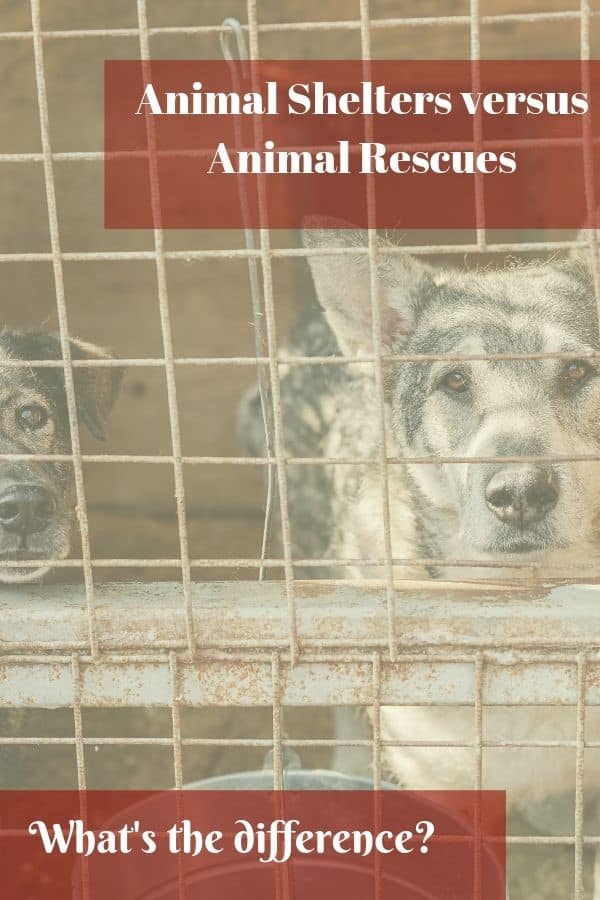
ANIMAL SHELTERS VERSUS ANIMAL RESCUES – WHERE SHOULD I ADOPT?
A basic question that’s often asked is what’s the difference between an animal shelter and an animal rescue? The answers are not always straight-forward, but I hope to dispel some of the confusion.
SOME BASIC DIFFERENCES
- Animal shelters always have a physical shelter, although they may also use fosters for some animals. Rescues sometimes have a physical shelter, but they’re much more likely to use foster families to house their adoptable pets.
- Shelters can be either euthanizing facilities, or non-euthanizing facilities. Animal rescues never euthanize, except in cases of terminal illness or severe aggression.
- Animal shelters are generally non-specific to any breed or type of animal, and most take in both dogs and cats. Rescues can be general in nature, but are more often breed, species, age, or special needs specific. For example, Gray Face Acres in Virginia only takes in senior dogs. There are many breed specific rescues which may take only, for example, Great Pyrenees purebreds or mixes.
- Animal shelters are generally, but not always, limited in the area to which they can adopt. While this is also true of most rescues, there are some which adopt over a wide area of the country, such as Big Fluffy Dog Rescue out of Tennessee.
- Animal shelters have to be careful about accepting pets with serious medical or behavior issues due to lack of resources and space. In the time it takes to ameliorate a behavior issue or a serious health issue, many more adoptable pets could have found their forever homes. Because rescues are often run through fosters (and sometimes out of the founder’s own home), they are more able to work with an injured or ill animal. They can take the time to train a more difficult dog (we all know cats are not trainable!). That is why rescues often look for donations directly to veterinarians or to trainers, rather than to a general fund.

WHERE SHOULD I LOOK FOR MY NEW PET?
So……should you look to adopt through a shelter, or through a rescue? At a basic level, you will find just as many loving, furry companions at either place. Both shelters and rescues are all about finding the best pet for your household. There are a few considerations, though.

ADOPTING FROM A SHELTER OR A RESCUE – WHAT’S THE BEST CHOICE?
- Animal shelters are noisy, active places, and can be frightening for any dog or cat. If the animal is brand new to the environment, they may not be showing their true personality yet. Barkers may settle and become calm after being in a loving home for a bit; quiet dogs may become noisy. Cats who do not get along with other cats in the stressful environment of a shelter may become much more laid back in the home, or vice-versa. Spend time with the animal of your choosing, ideally in a quiet room without staff constantly popping in and out. And talk with the adoption counselors and/or kennel staff. They have had the chance to observe the animal more closely and in more situations than you will be able to in a shorter span of time. Ask how long the dog or cat has been in the shelter. The longer they have been there (I’m speaking of weeks, not months), the more true the read on personality will be. If you’ve found your furry soul-mate in the shelter, taking him home will open up another spot that can be filled by another homeless pet, and will give you a lifetime of fun!
- Animal rescues, particularly those which rely on fosters, can provide much more thorough information. Personality, behavior, habits, even health, are more evident in an actual home, living much like they would in yours. The drawback with rescues is that they are usually 100% volunteer run. They will take a little longer approving your adoption application, since many work a standard full-time job. Arranging meetings with the pet(s) you’ve expressed interest in, and arranging the pick-up will also be slower. Still, a little inconvenience is a small price to pay if you’ve fallen hopelessly in love with a rescue dog or cat. And, if you’re in a position, both emotionally and time-wise, to adopt a special needs, senior, or medically challenged animal, a rescue is the very best place to find one.

No matter where you get your rescue companion animal, you will know that you have provided a loving, permanent home for a pet. Without you, that animal might have ended up alone and homeless. Or worse, euthanized. And the good feeling that you’ll get from saving an abandoned animal is, of course, what adoption is all about – enjoy!


